How we pursued new approaches and shared what we learned
When our team here at Levsha decided to take on the localization of Trials of Fire, a game from UK-based indie developer Whatboy Games, we were beginning an unusual experiment.
Our aim was to find innovative approaches to the low-budget localization of indie games. We needed a way to save ourselves time, money, and hassle without compromising on quality.
There were several driving forces that motivated us:
- We wanted to prove to ourselves that we were capable of whatever we set our sights on.
- We knew that we would benefit from the experience and expand our vendor base by bringing on new, tried-and-tested talent. We figured that by attracting and testing new people, they would come to be a huge asset to us over time.
- Strong sales in Russia would not only look great in our portfolio, but also provide a chance to build solid friendships with developers who might need our services more fully at a later date.
- Karma. "He who doeth a good deed without hope of recompense shall bring in an abundant harvest" — probably a quote from Jason Statham or Lao Tzu or something; we're not quite sure.
- We didn't expect instant profits. The whole team understood that the project would run primarily on the enthusiasm of its team members. But, nonetheless, we tried our best to carry out the four points above.
That's why we ventured down this road, which was, indeed, a bona fide trial of fire.
So what is Trials of Fire, anyway?
Trials of Fire is an exciting tactical roguelike with TCG elements, 3D environments, captivating art, and memorable characters.
The graphic style is inspired by Earth’s volcanic landscapes, rare astronomical phenomena, and other elements that may present themselves in a primordial apocalypse. The game’s profound and detailed lore—the story and particular features of the in-game universe—is worthy of a major role-playing adventure.
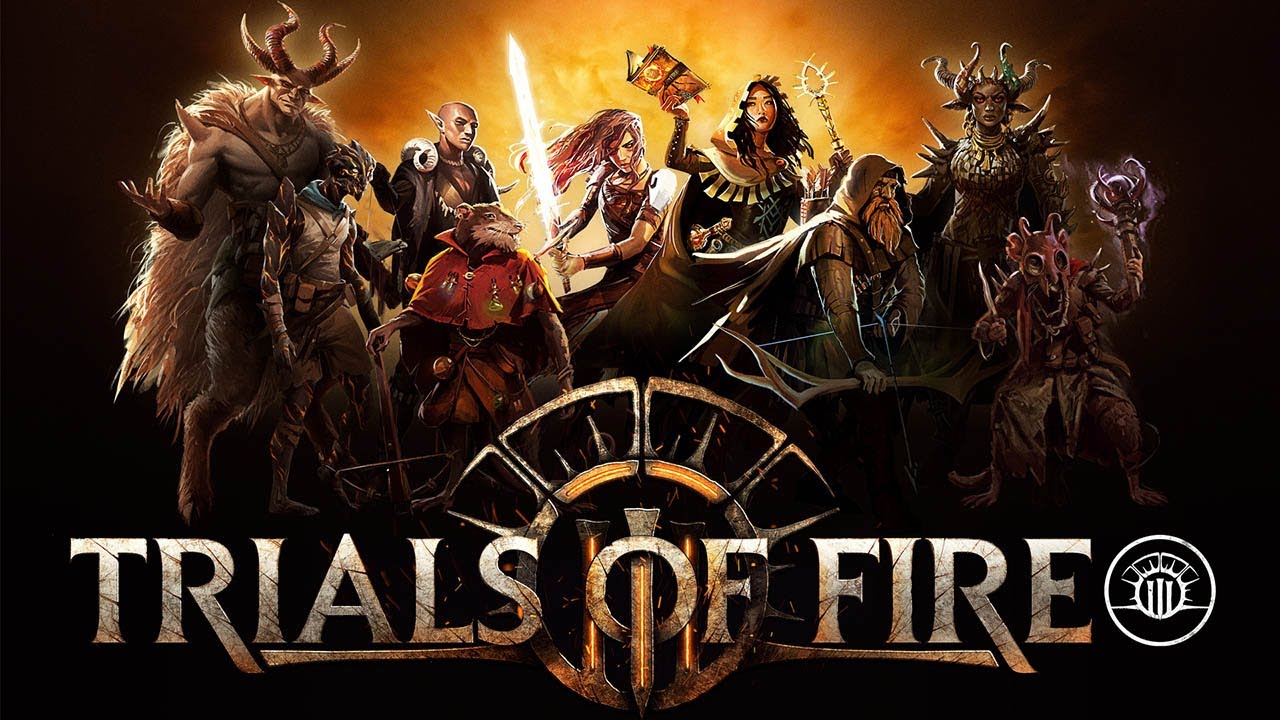
Sounds pretty awesome, we know! But you probably haven't even heard of the game until recently. Why is that?
Reason #1. Even though Trials of Fire was in open beta, it's an indie game with almost no budget for marketing. Fortunately, that didn't prevent the project from being noticed by Pax West Showcase and receiving positive reviews from Western critics. But that’s not everything—after all, a good half of all the brilliant movies presented at film festivals are ignored by the general public. Luckily, that wasn't the case for Trials of Fire—we, at least, knew about the game.
Reason #2. The problem that plagues all indie developers: no localization. Until Trials of Fire was translated into Russian, its sales in Russia made up only 1–2% of the total number of copies. Remember those numbers; we'll get back to them later.
And yet, destiny brought Whatboy Games and our studio together...
Localization into other languages is one of those considerations that is easy to push off to the side as something to deal with 'later'. But it is also something that, when you finally get around to doing it, you wish you'd done sooner.
Dax Ginn, studio director at Whatboy Games
Dax Ginn, studio director at Whatboy Games
It all started out at the Indie Mega Booth 2019 Pax West Showcase, where one BizDev manager we knew met Dax. Dax is one of the directors at the Whatboy Games indie studio, which had only just gotten up and running at the time. A month later, that same BizDev manager introduced Dax to Fedor, the managing partner at Levsha, who knew about their debut project, Trials of Fire, and about their interest in localizing it.
But it was clear that the main concern of Whatboy Games was actually to just release the game, and that localization held a lower priority. But we saw this project as an opportunity to try out something new and lay a foundation for further work together.
In November 2019, Fedor and Dax met in person in Brighton. There, over a pint of a strong unfiltered tea, they once again got down to the topic of budgets, the fate of indie studios and, of course, Trials of Fire.
And so it all began...

Every bit helps
At first, we tried to distribute portions of the text to our translator interns before passing them into the merciless hands of our in-house editor.
NB: We would like to note that these were not unpaid test tasks. We believe that using tests to translate real-world projects is a big yikes (to say the least!) and very bad practice. Tests were only used to select the best candidates for the job. After successfully passing the test, applicants were given paid internship tasks.
Imagine what the world of indie development would look like if this system worked. Unfortunately, it didn't.
Interns don't show up at the company door every day and, when they do, we usually don't assign them large tasks at first. If they were our only resource, localization would take months—and that’s only talking about projects with under 100,000 words.
But the slow pace of the process is not even the major issue here. What's worse is the resulting monstrous hodgepodge of incongruous styles, mismatched terms, and serious mistakes made by translators who lack experience in localization.
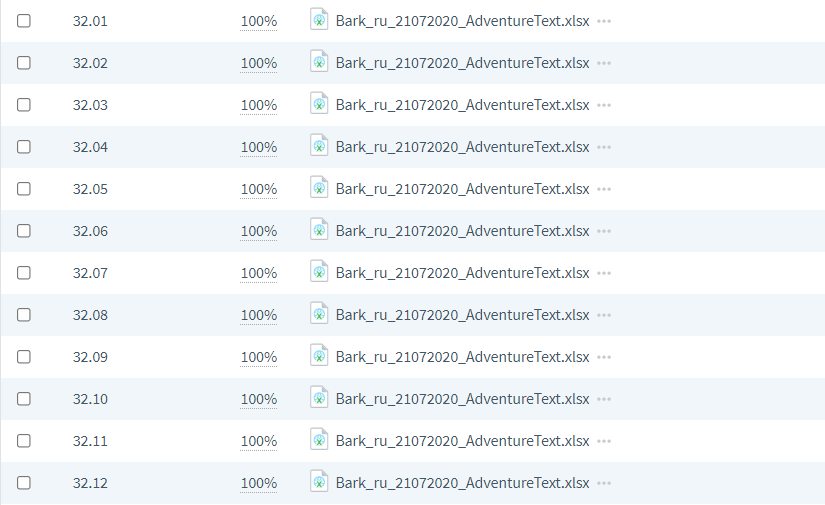
Splitting a file into multiple small portions and distributing them among different translators can be a nightmare for editors, which can affect quality

The majority of errors made are due to variables. Here, the translator didn't consider that a Follower could also be female—an example of a very common mistake when translating into Russian
This first attempt yielded a patchwork abomination of varying translations. Linking them into a coherent whole would be a tall order for even an experienced editor. And, alas, we didn't have a skilled editor on hand with oodles of free time and an inclination to underpaid labor. So, we decided to call it quits, appreciate our lessons learned, and move on.
Next, our journey led us to a game expo. While there, we connected with a team that produced amateur translations of Japanese novels and comics. Old hands like us don't normally work with newbies and novices—after all, everyone wants a level 100 Jedi Master on their projects. These guys may not have fit that description, but it was for that exact reason that their services were so affordable.
This team of Japanese novel enthusiasts was so boiling over with energy and drive that we decided to try our luck with them. We sent them a small test task and... well, it didn’t quite pan out.
And we think we know the reason why. Game localization is a distinct field of translation which requires specific knowledge—hence, there's a high barrier to entry. Plenty of good translators with other specialties may fail to deliver quality work when it comes to game-related texts.
Given enough time and labor resources, it would be possible to train up new translators and allocate more time to the editing phase so that even the sloppiest of translations could be salvaaged. But, remember, we were working on pure enthusiasm, trying to level up our karma, and were short on bored editors with a charitable inclination. And, thus, we had to say our goodbyes to the team of amateur translators.

Summer School
By early fall of 2020, only around 10,000 words of 65,000 were translated. Meanwhile, the game was slowly approaching its release date. It was time to prove that we meant business—delivering results and finally getting the localization done. Fortuitously, this was the precise time that we finished our Translation & Localization Workshop at the Summer School.

Fresh from their crash course on localization, our students were eager to translate. We looked at them, looked at the text, and saw an opportunity to kill two ratlings with one stone.
Our Summer School students would gain experience working on a real-world project while we would get reasonably priced translators.
Naturally, it wasn't all sunshine and roses. At the workshop, we gave our students a strong foundation, but couldn't cover every possible facet of localization in such a short time. And sure, when students stumbled onto something they didn’t know, they could turn to their more experienced colleagues for advice. But even so, they couldn’t absorb the enormous amount of new and complex information in our field right away.

Besides, some people might not be ready to translate large volumes of text. And it takes some time before a beginner can reach the industry standard of 2,500 words per day. That's one of the reasons why studios work with inexperienced translators infrequently and seldom assign them to bigger projects. Moreover, many of them have other commitments, like school or additional jobs, which can get in the way and interfere with deadlines.
But isn't that why we started this whole thing with Trials of Fire in the first place—to acquire and share expertise that wouldn't be available otherwise?
Our workshop students, who translated the better part of the game, now have a real-world large-scale project under their belt. They were even given mention in the credits, which is not common practice.
Usually, interns are cannon fodder. And when something goes wrong, companies tend to blame it all on the no-name newbie at the bottom. Here, it was a completely different story. Interns were given a high degree of independence, an awesome project to work on, and eternal glory in the form of a credit mention.
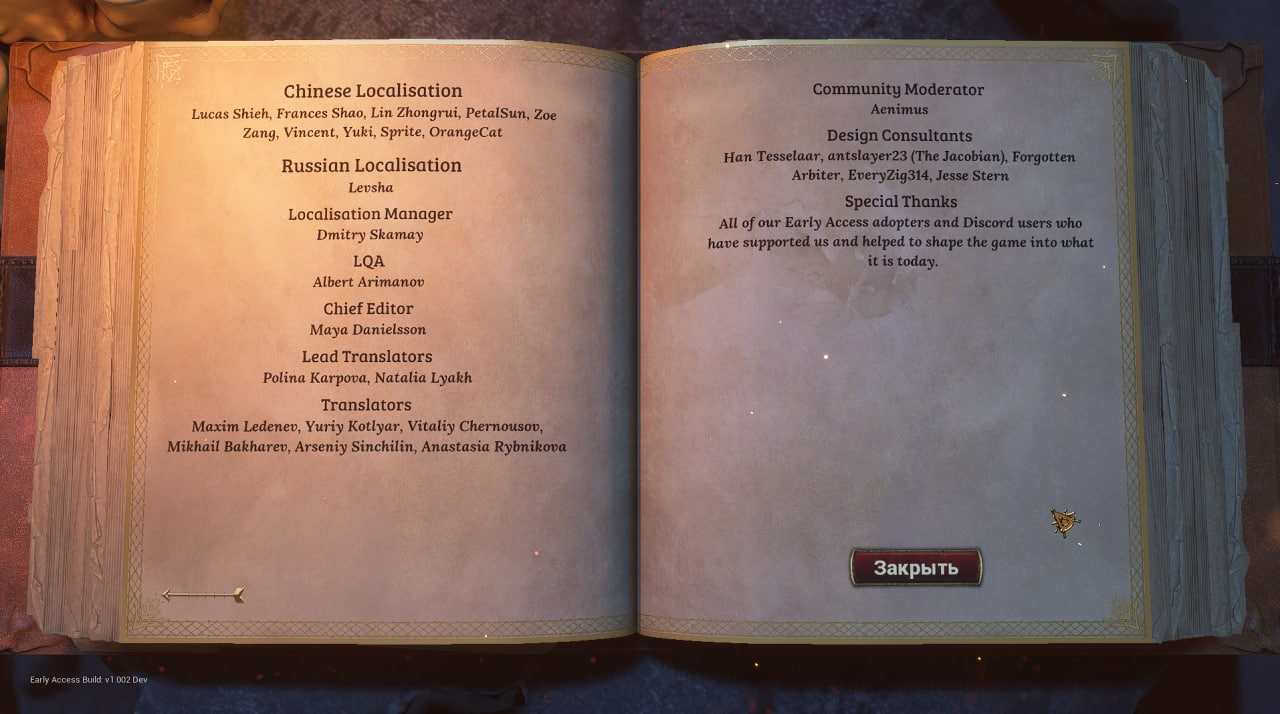
And for more standard projects, we sought out more skilled and knowledgeable vendors to ensure a swift and streamlined process. But this time around our five magical tenets drove us to perform a good deed, which wasn't required of us but which we eventually did accomplish.
In da Levsha
Certainly, we leveraged not only third-party vendors, but also our in-house resources. For example, Polina, our vendor manager, decided to try her hand at translation after a significant hiatus. She localized the in-game glossary, which became an important reference for other vendors.
She also proved a simple fact: localization is not a hobby. It is hard work and requires significant resources. Even if it warms the cockles of your heart and brings you joy, it’s hardly possible to combine localization with another, primary job. Polina also tried out the role of project manager, but found it difficult to juggle with her key responsibilities. She was soon disillusioned with the idea and left the position. Indeed, localization manager is not a job for everyone—it has its fair share of complexities.
Localization is not a hobby. It is hard work and requires significant resources.
But then Dima came along. He took over from Polina and became a full-fledged manager for Trials of Fire. It was the first project he managed on his own and built from the ground up. Despite the difficulties of composing a team, determining each person's strengths and weaknesses, and streamlining all the processes involved, he thoroughly enjoyed the experience.
Another problem Dima faced was that of communication. Have you ever tried to get through to developers while they're on holiday? He found himself having to write line-long regexps (really, a full line!), but at least didn’t have to chase deadlines—a treat for any manager, especially one on their first independent project.
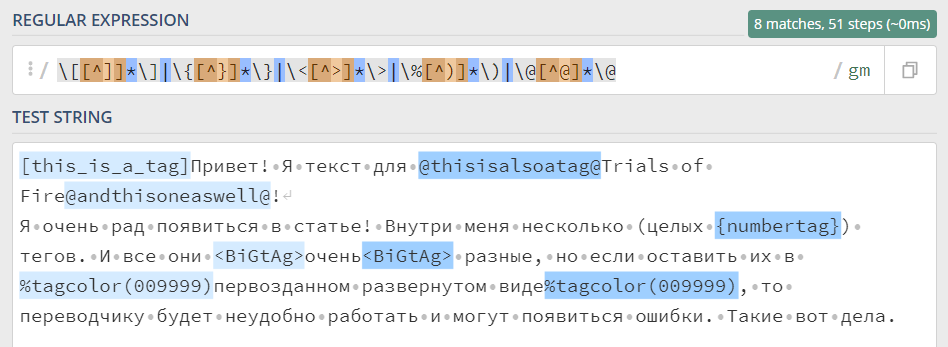
Regular expressions (see the top line in the screenshot) are character sets that describe certain text constructions. In localization, we use these expressions to describe tags. This way, a CAT tool can detect and wrap them so the translator and editor don’t have to struggle with all those squiggles, which all need to make it to the target safe and unadulterated.
Our in-house editor Maya, who was diligently putting together the many pieces of the game's text since day one, corrected mistakes and maintained the game’s overall style. We feel obligated to admit that having Maya on board was cheating, just a tiny bit. But without her expertise, the whole process would have taken exponentially longer and eaten up many more resources. Diving into experiments without someone like Maya on your team is risky, but possible. We got lucky, though, and pulled through.
On the other bank of the workflow
It's common practice to attract the wider community to a game's development and improvement. Trials of Fire was no exception.
According to the developers, the community helped immensely when Trials of Fire was in open beta. Many new fans spotted bugs and commented on the in-game balance. Having this help directly from the game’s target audience was a huge plus.
But it's another story with localization. Whatboy Games was willing to bring the Russian-speaking community in to assist with the project; but, as it turns out, even a sincere love for the game isn’t enough when it comes to professional localization: not everyone is able to work on enthusiasm alone.
Not all fans are ready to delve into the complexities of localization and read the same text again and again, digging into it for hidden meanings and deciphering oddly formulated sentences.

Some comments from the community were practical and helpful, but sometimes fans didn't account for localization-specific considerations. And that was totally understandable—they simply lacked the knowledge and skills of professional game translators.
However, now players can join the game's Discord channel and help us identify bugs. Yep, that’s right—we also do the testing for this project.

Click the link in the description to join us: https://discord.com/invite/rrK97Ay
The developers have learned some lessons, too. As it turns out, certain tags are only applicable to the English language, and others should be cut in Russian altogether.
Trials of Fire features a hyperlink system in its narrative content that requires very specific mark-up in the text files and during localization, these elements need to be handled in a very specific way. So working with a localization team who understand the importance of these elements goes a long way in avoiding complex technical and cultural mis-steps.
Dax Ginn, studio director at Whatboy Games
Dax Ginn, studio director at Whatboy Games

The words in angle brackets are links to certain articles in the in-game glossary. To make them function in Russian, we needed to write additional code and use the scheme marked in yellow in the picture (a Russian word in the necessary case + the source word in its singular form) throughout the whole text. Besides, we agreed to get rid of some blue tags to make the text sound more natural in Russian.
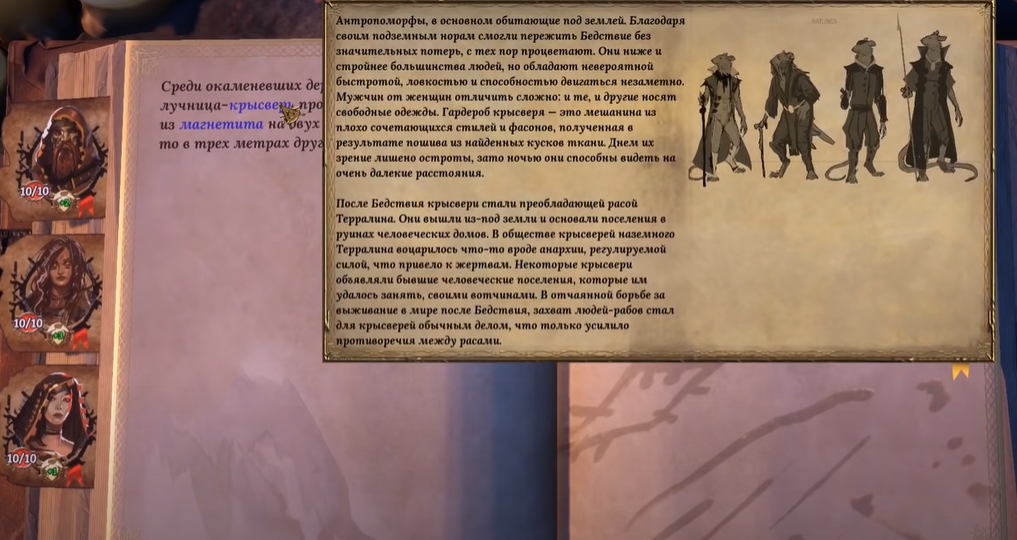
When hovering the cursor over a blue word, the appropriate page of the in-game glossary appears. This is essentially the player’s gateway into the game's profound lore.
Another common issue is so-called char limits—the maximum number of characters allowed for a certain segment. It sometimes happens that a char limit isn't specified, translators get long-winded, and then we suddenly realize the target text is spilling out of its reserved in-game space.
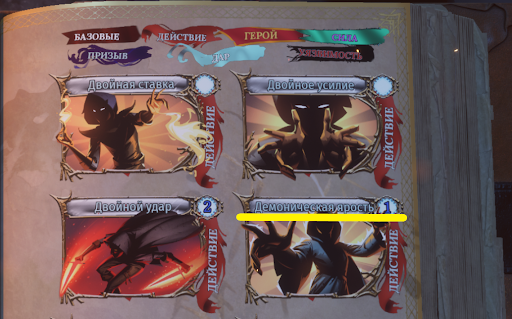
Here, the text overlays the design elements. This shouldn't be the case, but it happens sometimes due to char limits. It's worth noting that these card names didn't have specified limits, but the Russian language’s propensity for long-windedness plus a non-scaling interface caused all these nasty little bugs. (Not to worry, we fixed them!)

Game-related questions sometimes uncover surprising details :)
But Whatboy Games trusted us completely. And even though we went somewhat rogue trying out all these different approaches, we always kept in mind that our ultimate aim was to deliver a quality product.
When time and resources are tight — you just want to be able to hand off important work to people that you trust and feel confident that they will do a great job.
Dax Ginn, studio director at Whatboy Games
Dax Ginn, studio director at Whatboy Games
How did it go, you might ask? Well, the developers are happy—the game's sales in Russia have gone up to 6–7%, which is roughly equal to the sales in England, the game's homeland! The game is gaining fans every day. Trials of Fire even got featured in a Russian gaming magazine and was graced with positive reviews and with joy at the fact that the game has a Russian-language version.
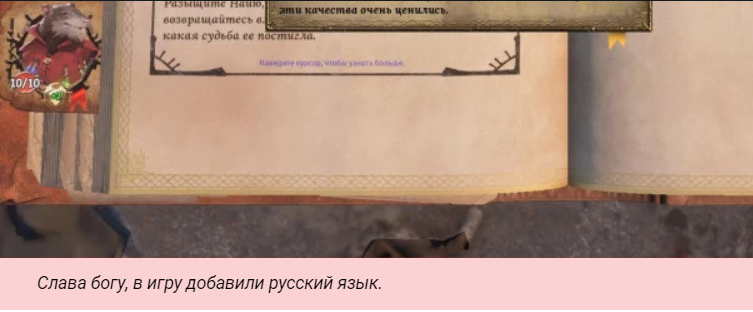
Comment from Stopgame’s review of Trials of Fire
The outcome
Our team here at Levsha was able to successfully carry out our big experiment and test new approaches to low-budget localization.
The company’s portfolio features another game that we worked on, as well. And the result of our combined efforts proved to be so good that Whatboy Games contracted us for a standard-priced localization into other languages. So, despite all our trials and tribulations along the way, our adventure has a happy ending.
So, the question is, are we going to do it again? We feel that we have learned and tried out everything that we wanted to, and so we plan on simply continuing our work in the format we’re accustomed to. However, we’ll do so keeping one eye on the fate of Trials of Fire and helping it earn the loyalty of players around the world.
Well, there you have it: an abundant harvest, good karma, and a few gold pieces thrown it :-)